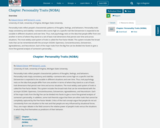
By Edward Diener and Richard E. Lucas, University of Utah, University of Virginia, Michigan State University. Personality traits reflect people’s characteristic patterns of thoughts, feelings, and behaviors. Personality traits imply consistency and stability—someone who scores high on a specific trait like Extraversion is expected to be sociable in different situations and over time. Thus, trait psychology rests on the idea that people differ from one another in terms of where they stand on a set of basic trait dimensions that persist over time and across situations. The most widely used system of traits is called the Five-Factor Model. This system includes five broad traits that can be remembered with the acronym OCEAN: Openness, Conscientiousness, Extraversion, Agreeableness, and Neuroticism. Each of the major traits from the Big Five can be divided into facets to give a more fine-grained analysis of someone's personality...
- Subject:
- Psychology
- Material Type:
- Lecture Notes
- Reading
- Author:
- Maura Krestar
- Date Added:
- 05/19/2021
